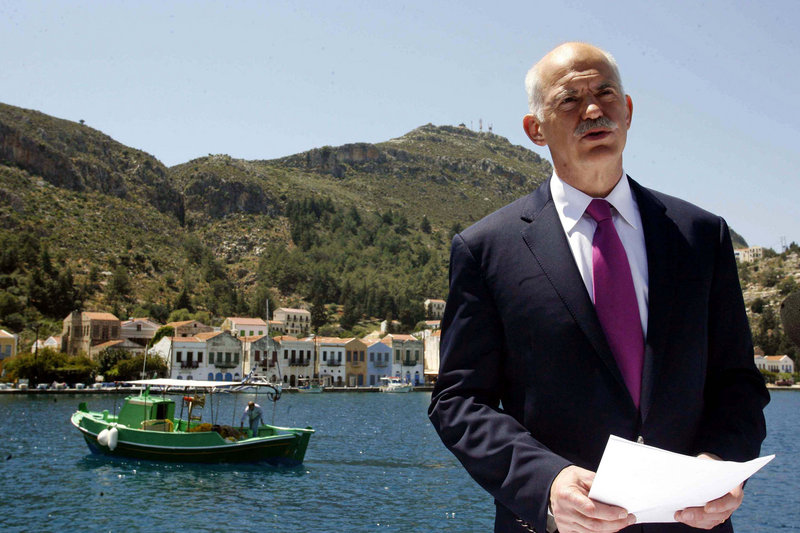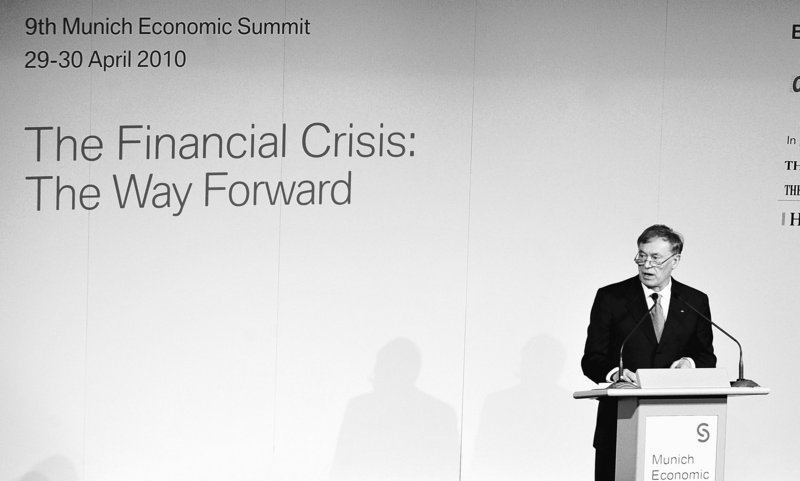ATHENS – It’s known as the cradle of Western civilization, but these days cash-starved Greece is viewed as more of a miscreant.
This nation where ancient infuses the modern, where buses and motorcycles whiz past stone remnants from classical times, has become a symbol of fundamental cracks in European unity.
At the opposite pole lies Europe’s economic engine, Germany, whose people vehemently oppose bailing out the Greeks.
The turmoil over Greek debt has hammered the markets, hinting at another round in the global financial crisis just as it seemed to be fading. It also raises fears that troubled Portugal and Spain are next, highlighting a North-South divide in Europe that challenges the viability of the European Union and its common currency.
Even if Greece avoids the worst — no sure thing, with some predicting it will be forced to restructure debt even after a multibillion dollar infusion of European and International Monetary Fund money this month — the cultural rift will stay. Germany and France are European Union linchpins; Greece is generally viewed as problematic, relying on its partners’ largesse and loose with statistics.
“They apparently treated their capital like waste,” said Ilona Reichelt, a German retiree standing Wednesday near the Brandenburg gate, the Berlin landmark. “It’s not like they’ve suffered an earthquake or a natural disaster. It’s a man-made disaster.”
Modern Greeks take pride in their ancestors, pioneers of law and politics that shaped Western society, while also relishing a good life of carefree spending, lax enforcement and early retirement.
RETIREMENT AGES 65, 60
The retirement age in Greece is 65 for men and 60 for women — similar to Germany, where it’s 67. But the Greeks shave off an extra 10 years for a wide range of jobs considered physically strenuous or hazardous. These include miners and port workers, as well as hairdressers (they have to stand all day and are exposed to potentially harmful chemicals), musicians, bakers and radio presenters.
In trying to explain how Greeks think, some point to Zorba the Greek, the fictional, free-spirited figure of dance. He’s not the type to get his finances in order.
“I wouldn’t say that all Greeks are Zorba, but part of every Greek is this love of life and this love of enjoyment,” said Nikos Dimou, a 75-year-old Greek author who studied in Germany and has been most industrious — producing 60 titles in all. “The Greeks have a rather negative view about the Germans because they work too much.”
Dimou attributes the differences between southern and northern Europe to the lack of a “Protestant work ethic” in the south — as well as the sunny Mediterranean climate, which slows the pace and encourages corner-cutting. contrast, Nordic countries have robust public finances, though Iceland’s economic spiral in 2008 puts the weather theory to the test.
Greece is a special case, Dimou and others say, because it belongs as much to East as West. Under Byzantine and then Ottoman rule, it skipped the Renaissance and Reformation, the ideas of the French Revolution and the rise of a bourgeois class. Then it played catch-up to the rest of Europe in the 19th century.
Now Greece wants $59.8 billion (or euro45 billion) from the 16 euro nations as well as the IMF. Germany, Europe’s largest economy and a model of efficiency, would contribute about a fifth of the cash.
In Germany, a lawmaker fired up debate by calling for Greece to sell its islands to bolster the budget. On Friday, the Bild newspaper showed a picture of Greek prime minister George Papandreou, saying: “Here comes the Greek panhandling for our billions.”
One German analyst described the crisis as a “Greek tragedy,” and said German voters did not want to be dragged down the “Club Med” road toward poor fiscal discipline.
“Germans wouldn’t be reluctant if this were a one-off thing,” said Heribert Dieter of the German Institute for International and Security Affairs. “But this is a restructuring that will go on for a long time.”
CRITICISM GOES BOTH WAYS
Some analysts warn that Greece might have to drop out of the eurozone, and said Europe would face a broader meltdown if Spain, a much bigger economy, veers toward debt default.
The criticism flies both ways — Germany and the European Central Bank have taken some darts for months of deliberation, and no action, on the Greek crisis.
Rafael Pampillon, economics professor at IE Business School in Madrid, noted northern Europe’s spending restraints, reformed labor markets and competitiveness and innovation, areas in which the South trails.
“Go tell a Thai investment fund, or an Indonesian or Chinese one, that Greece is not Spain and Spain is not Portugal. They see stagnant economies, euro-stagnant economies,” he said.
Still, the North-South scenario has nuance, and exceptions. Eastern European nations are getting structural aid and are in a class of their own, and Britain has a huge deficit and concerns about divided government ahead of Thursday’s election.
Indebted Ireland, which raised taxes and cut spending, would have to borrow to contribute to the Greek bailout.
“When California got into debt troubles, did Washington bail them out? No,” said Eugene McDarby, chief executive of an Irish personal-debt management company called MoneyVillage.ie.
“The Irish are already at breaking point trying to climb out of our own debt disaster. Should we really be expected to take responsibility for the Greek mess as well?”
ITALY SHARES BAD HABITS
Italy has the bad habits of the South, including high debt and sluggish growth. Confidence in Italy dipped after it barely was able to cover a sale of treasury bonds on Wednesday. But officials insist the high level of private savings and home ownership, as well as long experience managing a large public debt, have protected Italy from the worst.
Cartoonist Patrick Chappatte took aim at Europe’s conundrum last month in the Swiss newspaper NZZ am Sonntag, depicting reluctant EU and IMF bureaucrats dancing the syrtaki, a Greek jig, with a Greek man singing as cash spilled at his feet.
Though Greeks have enjoyed the benefits of easy credit, they face hard times ahead if the government bears down with IMF-led austerity measures that would cut wages and pensions, and could cramp growth for years. There have been street protests, but not as large as demonstrations during similarly tough policies in the 1990s.
“I hear from a lot of Greeks that Germany is so above us, and the system there works, and the schools are better, everything is better,” said Zoe Kazani, a 22-year-old art gallery director in Athens.
“But at the end of the day, everybody wants to be in Greece because it’s a fun way to get away from your problems.”
Associated Press writers Juergen Baetz and Verena Schmitt-Roschmann in Berlin, Daniel Woolls in Madrid, Shawn Pogatchnik in Dublin, Colleen Barry in Milan and Bradley Klapper in Geneva contributed to this report.
Send questions/comments to the editors.




Success. Please wait for the page to reload. If the page does not reload within 5 seconds, please refresh the page.
Enter your email and password to access comments.
Hi, to comment on stories you must . This profile is in addition to your subscription and website login.
Already have a commenting profile? .
Invalid username/password.
Please check your email to confirm and complete your registration.
Only subscribers are eligible to post comments. Please subscribe or login first for digital access. Here’s why.
Use the form below to reset your password. When you've submitted your account email, we will send an email with a reset code.